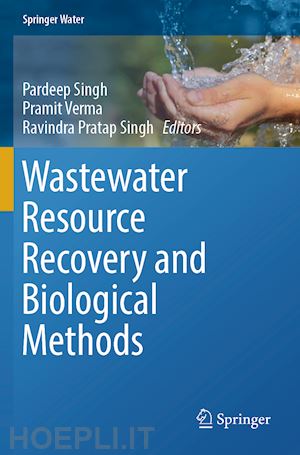
Questo prodotto usufruisce delle SPEDIZIONI GRATIS
selezionando l'opzione Corriere Veloce in fase di ordine.
Pagabile anche con Carta della cultura giovani e del merito, 18App Bonus Cultura e Carta del Docente
The book is unique in highlighting the issue of wastewater as one of the important environmental issues. The uniqueness also lies in exploring the concepts of converting waste into resources in the form of bioenergy, biofertilizers through various biological methods. Given the international scenario, the chapters of this book are designed to include both anaerobic and aerobic methods of resource recovery from the industrial wastewater. The book is a step toward design with nature and the concept of green chemistry.
Waste menace is one of the most voiced and unsolved problems in the entire world. The whole world is facing the threat of water pollution, soil pollution/ land pollution, odour pollution from the growing waste. Though we find many missions and programs at international, national, and regional level to solve the waste associated issues, this is mostly in context with the solid fraction of the waste. Very little is being done to manage the liquid part of the waste orwhat we call the wastewater.
The conversion of wastewater has the potential to be converted to energy in the form bioenergy, bio-fertilizers, electricity, nutrient recovery, etc. The use of sludge as biofertilizers solves the problem of sludge management on the one hand and production of organic crops on the other. The biological treatment methods like sludge treatment gives the farmers the source of biofertilizers and organic manure for the plants. In the present scenario, energy crisis is also one of the issues that we are facing particularly in context with the thermal power plants which are environmentally highly polluting. Through various techniques like microbial fuel cells or biohydrogen, we get a source of cleaner energy. So, through this book, we try to produce the content and information to give the audience an understanding of the waste water as one of the environmental and health issues and mitigation strategies. The book gives a sufficient understanding of how wastecan be turned into a resource.
Dr Pardeep Singh is presently working as Assistant professor (Department of Environmental Studies, PGDAV College, University of Delhi New Delhi India). He obtained his Master’s degree from the Department of Environmental Science Banaras Hindu University, Varanasi, India. He obtained his doctorate from Indian Institute of Technology (Banaras Hindu University) Varanasi. The area of his doctoral research is the degradation of organic pollutants through various indigenous isolated microbes and by using various types of photocatalytic. He has published more than 65 papers in international journals in the field of waste management and edited more than 45 books.
Pramit Verma did his PhD from the Integrative Ecology Laboratory (IEL), Institute of Environment and Sustainable Development, Banaras Hindu University, Varanasi. He has also completed his post-doctorate from the Nicolaus Copernicus University in Torun, Poland. He has published several research articles and a technical report while participating in various national and international conferences, workshops and seminars. He is currently working on urban sustainability policies and energy efficiency.
Dr Ravindra Pratap Singh is currently working as Chief Engineer, Central Public Works Department (CPWD), Govt. of India, with over 25 years of experience in the field of Public Procurement, Project Management, monitoring /implementation of environmental and social safeguards, urban planning, solid waste management, wastewater treatment etc. Ravindra has a special interest in Sustainable Development, especially in sustainable construction. He worked with World Bank on Highway Projects in India and worked with JICA on Japanese Govt. grant aide project at Varanasi. As an expert and member of the heritage conservation committee on the river Ganga, he was associated with the conservation of the river in Varanasi. Along with the engineering profession, he has a keen interest inthe field of academics also. He completed Graduation in the field of Civil Engineering in the year 1989 from Kamla Nehru Institute of Technology, Post Graduation in Civil Engineering (specialisation in structure engineering) from IIT (BHU) in the academic year 1991-1993 and PhD from the Institute of Environment and Sustainable Development, Banaras Hindu University, Varanasi India.











Il sito utilizza cookie ed altri strumenti di tracciamento che raccolgono informazioni dal dispositivo dell’utente. Oltre ai cookie tecnici ed analitici aggregati, strettamente necessari per il funzionamento di questo sito web, previo consenso dell’utente possono essere installati cookie di profilazione e marketing e cookie dei social media. Cliccando su “Accetto tutti i cookie” saranno attivate tutte le categorie di cookie. Per accettare solo deterninate categorie di cookie, cliccare invece su “Impostazioni cookie”. Chiudendo il banner o continuando a navigare saranno installati solo cookie tecnici. Per maggiori dettagli, consultare la Cookie Policy.